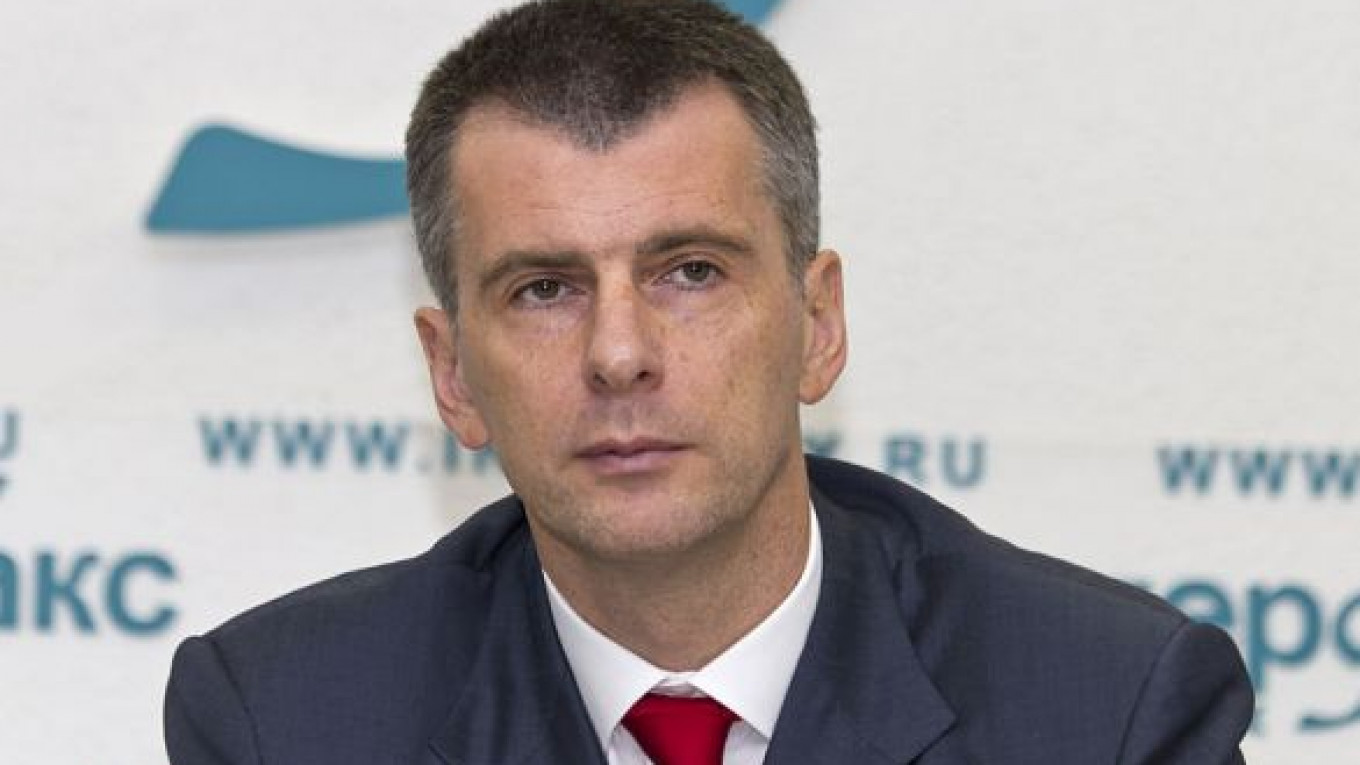Tycoon Mikhail Prokhorov agreed Monday to buy Suleiman Kerimov's 21.75 percent stake in Uralkali, the world's largest potash miner, in a deal that seeks to calm tensions over the collapse of a sales cartel.
Sources familiar with the deal said it had been blessed by President Vladimir Putin as a way of repairing ties with ally President Alexander Lukashenko of Belarus — which arrested and prosecuted Uralkali's boss after the Russian firm quit the marketing pact in July.
Uralkali's shares rallied 2.6 percent on the news, extending gains made toward the end of last week on speculation that a deal was imminent. Talks continue on the sale of stakes held by Kerimov's partners, the sources said.
Analysts doubt, however, that Uralkali's sales partnership with state-owned Belaruskali, which had controlled 40 percent of the $20 billion global market for the soil nutrient, can be put back together.
Prokhorov's investment firm, Onexim, said it would complete the transaction shortly but did not disclose terms of the deal, which it said does not require regulatory approval.
Uralkali’s market capitalization on Monday suggested a 21.75 percent stake would be worth about $3.5 billion. Kerimov is not prepared to sell for less than $4.35 billion, Vedomosti reported Monday.
"The purchase of the stake in Uralkali is a long-term investment in a company that is unique from the standpoint of its position in its industry and its role in the world economy," Onexim CEO Dmitry Razumov said in a statement.
Sources on both sides of the talks said Kerimov's asking price was based on a $20 billion equity valuation but the final price was flexible and would probably be slightly lower.
"Valuations are still being pushed backwards and forwards," one financial source said. "There is still quite a lot of wood to chop in terms of negotiating it and funding."
Prokhorov, who owns the U.S. professional basketball team Brooklyn Nets, and who is worth $13 billion, according to Forbes magazine, is flush with cash after selling his stake in gold miner Polyus a year ago to Kerimov and partners for $3.6 billion.
State-controlled banks Sberbank and VTB, and possibly a European bank, may back the deal, sources said.
The rally in Uralkali shares extended gains made into Friday's close, when the business had a market value of $15.8 billion.
Prokhorov is a long-time former business partner of Kerimov, who has launched a political career. He ran against Putin in last year's presidential election, placing a distant second, but remains a leading figure in the business establishment.
Talks Ongoing
Sources familiar with the talks have said that Kerimov, the Dagestani-born owner of top-flight Russian soccer club Anzhi Makhachkala, was a reluctant seller.
But, they add, a deal was a precondition to secure the extradition of Uralkali CEO Vladislav Baumgertner, who was arrested in Minsk and has been charged with exceeding his powers and embezzlement. He faces up to 12 years in jail if convicted.
Talks continue on the possible sale of the stakes in Uralkali held by Kerimov's partners. Filaret Galchev owns 7 percent of Uralkali and Anatoly Skurov 4.8 percent, bringing their combined interest to just more than a third.
Along with Prokhorov, businessman Dmitry Mazepin, co-owner of fertilizers producer Uralchem, and Russian state arms-to-technology group Rostec are interested in buying into Uralkali, several sources said.
Politics or Business?
Asked whether the deal was good politics or good business, one source familiar with all parties involved said: "It is business, as Kerimov is selling with a premium to the market."
Prokhorov was keen to bring in Belarussian-born Mazepin to help manage Uralkali and its relations with Minsk. "This asset is difficult," the source said.
Rostec, run by Putin's colleague at his KGB posting in 1980s East Germany, Sergei Chemezov, would serve as a "minder" for the state if it was brought into the deal, the source added.
Asked whether the Kremlin had given the deal a green light, Putin's spokesman Dmitry Peskov said: "This is totally a business issue and one does not need approval from the Kremlin."
Russian state company Rostec does not plan to buy Uralkali, a Rostec representative said.
Uralkali holds about 12 percent of its shares in treasury and these are expected to be cancelled within six months. Should Kerimov's partners also sell, the buyers' combined stake would rise to 38 percent, ensuring de facto control over the business.
A Message from The Moscow Times:
Dear readers,
We are facing unprecedented challenges. Russia's Prosecutor General's Office has designated The Moscow Times as an "undesirable" organization, criminalizing our work and putting our staff at risk of prosecution. This follows our earlier unjust labeling as a "foreign agent."
These actions are direct attempts to silence independent journalism in Russia. The authorities claim our work "discredits the decisions of the Russian leadership." We see things differently: we strive to provide accurate, unbiased reporting on Russia.
We, the journalists of The Moscow Times, refuse to be silenced. But to continue our work, we need your help.
Your support, no matter how small, makes a world of difference. If you can, please support us monthly starting from just $2. It's quick to set up, and every contribution makes a significant impact.
By supporting The Moscow Times, you're defending open, independent journalism in the face of repression. Thank you for standing with us.
Remind me later.






